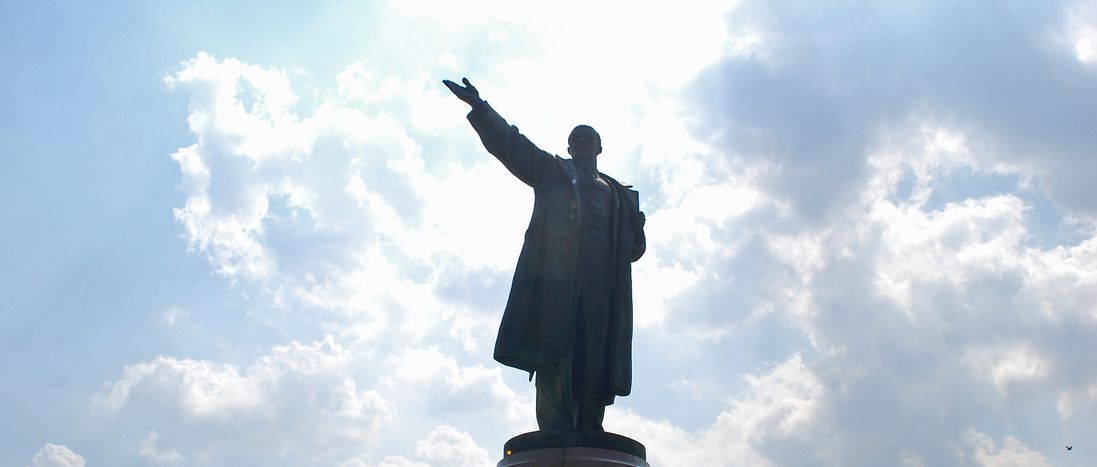
Lenin's Legacy- Ukraine, Russia, Siberia
Published on
During anti-government demonstrations in December 2013, protestors in Kiev toppled a statue of Lenin and attacked it with hammers. In Kharkhiv, protestors have proposed erasing Lenin’s legacy by renaming Lenin Street, 'Lennon Street'. But although his heart stopped ninety years ago, Lenin still resonates in the Russian Federation
In Russia Lenin is everywhere. His legacy lives on in the lessons in political kitsch served up by Putin’s personality cult. His legacy lives on in the sacrifice of civil liberties for the progress of the state. He lives on in colossal concrete replicas in almost every town square, in a street name in every city, in gift shops on every street. Most perversely, he 'lives' on in a parody of life, suspended in a box in front of the Kremlin. Patched up and perhaps more wax than flesh, the endless repairs on his corpse are testament to Russia’s refusal to let Lenin die.
 Seventy years ago, during World War Two, Lenin’s corpse set out on the Trans-Siberian railway. He was fleeing the very same Germans who gave him safe passage to Russia in 1917 in the hope that he would derail Russia’s war effort with a revolution. So whilst he served the German cause in World War One, he spent World War Two hiding from them in the Agricultural Academy in Tyumen.
Seventy years ago, during World War Two, Lenin’s corpse set out on the Trans-Siberian railway. He was fleeing the very same Germans who gave him safe passage to Russia in 1917 in the hope that he would derail Russia’s war effort with a revolution. So whilst he served the German cause in World War One, he spent World War Two hiding from them in the Agricultural Academy in Tyumen.
As you travel further east into Siberia, Lenin becomes bigger and strangely more ubiquitous. The most remote, crumbling hamlets with no tarmac and a handful of houses still nearly always have a street named after Lenin. You see 'Lenin Street' nailed to collapsed wooden shacks in Buryatia and precariously balanced piles of bricks by Baikal.
Ulan-Ude, the capital of Buryatia beside Lake Baikal boasts the biggest Lenin cranium on the planet. The head was apparently placed there as punishment for Buryat resistance to the Bolsheviks. Local craftsmen allegedly had the last laugh by sculpting his features with an Eastern vibe. They colonised the Communist conqueror.
However huge, no recreation of Lenin’s cranium can do justice to the scale of the impact he had on our planet. It is hard to imagine how the world would look if Lenin hadn’t been there to lead the Bolshevik revolution. No century of Communism. No victory over Nazi Germany. No half century of Communist-Capitalist Cold War.
 Although no one misses the cruel realities of the Soviet Union, some people seemingly miss the ideological sheen. President Vladimir Putin himself declared the collapse of the Soviet Union the ‘greatest geopolitical tragedy’ of the 20th century. Sometimes it seems people miss having something to believe in. Human memory is selective and we have an impressive ability to elevate the positive and suppress past problems.
Although no one misses the cruel realities of the Soviet Union, some people seemingly miss the ideological sheen. President Vladimir Putin himself declared the collapse of the Soviet Union the ‘greatest geopolitical tragedy’ of the 20th century. Sometimes it seems people miss having something to believe in. Human memory is selective and we have an impressive ability to elevate the positive and suppress past problems.
In a bank in Yekaterinburg I witnessed a dramatic display of this nostalgia for socialist ideology past and the resentment of social fragmentation present. A man was mincing around in a sparkling silver suit. The seams were lined with fake diamonds and his tie was encrusted with sequins. Resplendent in his livery he oozed everything but class. He strutted up and down like a space age peacock.
 He picked up a microphone, a photographer moved in, and with a grandiose flourish the peacock revealed a huge lucky dip from underneath a sheet. He announced the grand-draw to the bemused customers- three crusty old ladies in grubby coats (and me). In melodramatic tones he declared the grand draw open to all customers with a loan of over 500,000 roubles (£10,000). This certainly applied to nobody present.
He picked up a microphone, a photographer moved in, and with a grandiose flourish the peacock revealed a huge lucky dip from underneath a sheet. He announced the grand-draw to the bemused customers- three crusty old ladies in grubby coats (and me). In melodramatic tones he declared the grand draw open to all customers with a loan of over 500,000 roubles (£10,000). This certainly applied to nobody present.
The peacock continued to strut and elucidate this grand draw which nobody could enter. The three old ladies became increasingly disgruntled, growling and tugging their threadbare coats in disgust. Eventually one of them exploded with revolutionary fervour, ‘In the Soviet Union everybody could enter the grand draw! Everybody! 500,000 roubles… What the hell is this! SSSHUGAR!’
It’s easy to see why they were angry about this shiny peacock forcing their exclusion down their throats. Their anger at their exclusion from the grand draw reflects the anger large swathes of the population feel at their exclusion from politics. To return to the meme of an eternal Lenin, his words in 1917 still ring true in Russia today, ‘The oppressed are allowed once every few years to decide which particular representatives of the oppressing class are to represent and repress them in parliament.’



